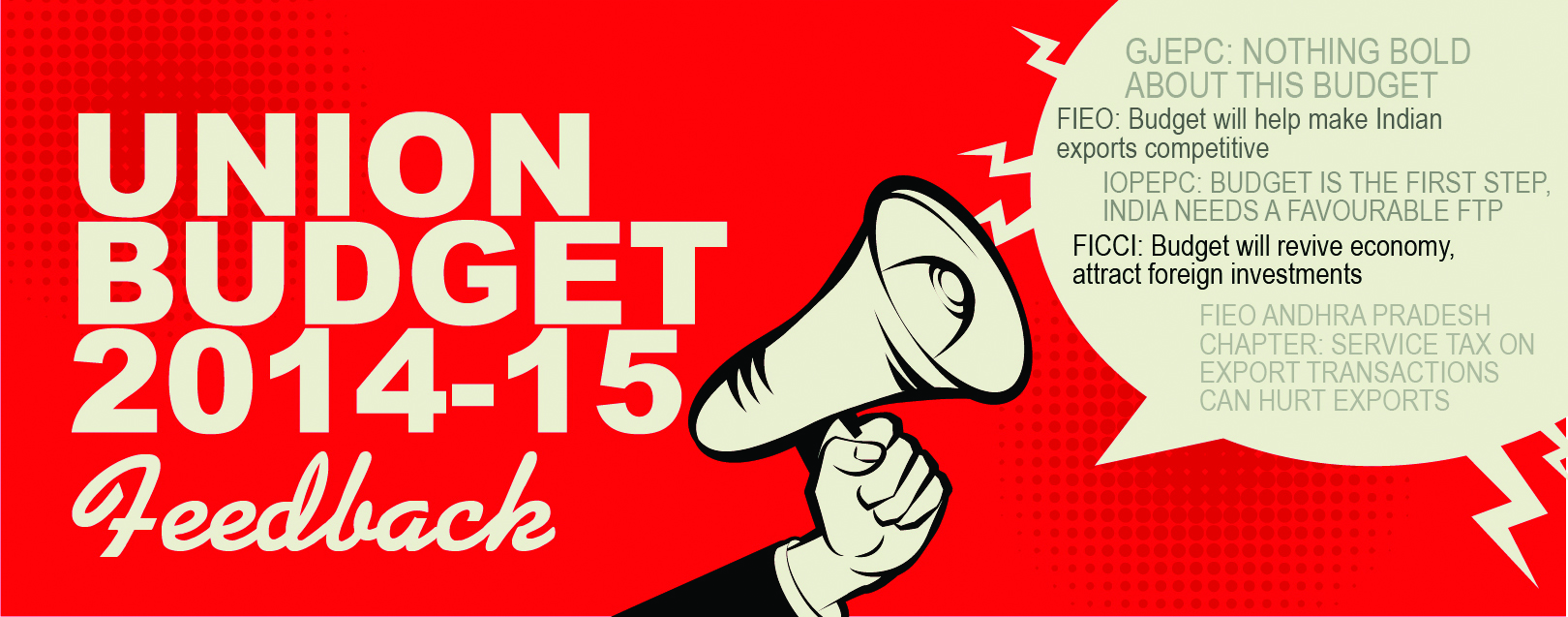
Union Budget 2014-15 Feedback
He says that the Finance Minister did not reduce the import duty on gold even by 2-3% (from the current 10%) which means that smuggling of gold will continue. Vipul Shah said that the Modi government’s maiden budget did not signal any bold reforms. However, he added that the Gem & Jewelry sector is happy that its recommendations for rationalization of import duty on broken diamonds and withdrawal of import duty on pre-forms of semiprecious and precious stones have been accepted. “Also the rationalization of import duty on processed diamonds to 2.5% will help the domestic manufacturing sector,” he said. IOPEPC: Budget is the first step, India needs a favourable FTP Kishore Tanna, Chairman, Indian Oilseeds And Produce Export Promotion Council (IOPEPC), says that while the Union Budget 2014 has welcome announcements such as a "Customs Single Window” and the establishment of an “Export Promotion Mission”, much more is required to get India’s economy back on track. “Government can complete this task by announcing a favourable Foreign Trade Policy,” he says. However, he adds that the government should have allowed free import of oilseeds to control inflation and announced other measures to improve the domestic edible oil sector.
PM Narendra Modi: Budget aims to make India skilled and digital
 Prime Minister Narendra Modi said that India’s economic system crumbled in the last decade due to which not only India but also the world lost hope. The first budget of his government is an effort to tackle the economic crisis. The PM said, “Since we formed the Government there were discussions about whether this Government can free the nation from crisis but the Railway Budget and today’s General Budget show that we are moving in the right direction.”
Prime Minister Narendra Modi said that India’s economic system crumbled in the last decade due to which not only India but also the world lost hope. The first budget of his government is an effort to tackle the economic crisis. The PM said, “Since we formed the Government there were discussions about whether this Government can free the nation from crisis but the Railway Budget and today’s General Budget show that we are moving in the right direction.”
FIEO: Budget will help make Indian exports competitive  M. Rafeeque Ahmed, President, Federation of Indian Export Organisations (FIEO), has welcomed the Union Budget 2014-15 presented by the Finance Minister today, saying it will help improve India’s competitiveness in manufacturing and exports. Investors are expected to return to SEZs, and the focus on roads, airports, sea ports, and power supply will reduce export delivery time significantly, he said. The FIEO Chief added that the increase in Duty Free Entitlements of trimming and embellishments for the readymade garment sector, exemption from basic customs duty on pre-forms of precious and semi-precious stones, reduction in basic customs duty on ethane, propane, ethylene, propylene, will benefit apparel, gems & jewellery and chemical sectors. FICCI: Budget will revive economy, attract foreign investments
M. Rafeeque Ahmed, President, Federation of Indian Export Organisations (FIEO), has welcomed the Union Budget 2014-15 presented by the Finance Minister today, saying it will help improve India’s competitiveness in manufacturing and exports. Investors are expected to return to SEZs, and the focus on roads, airports, sea ports, and power supply will reduce export delivery time significantly, he said. The FIEO Chief added that the increase in Duty Free Entitlements of trimming and embellishments for the readymade garment sector, exemption from basic customs duty on pre-forms of precious and semi-precious stones, reduction in basic customs duty on ethane, propane, ethylene, propylene, will benefit apparel, gems & jewellery and chemical sectors. FICCI: Budget will revive economy, attract foreign investments  Sidharth Birla, President, Federation of Indian Chambers of Commerce and Industry (FICCI), says that the Union Budget 2014-15 announced by the Finance Minister today will help the economy revive. “Through this budget the Finance Minister has set the ground for repair of the economy,” he said. Tax benefits for individual taxpayers will increase the purchasing power of Indians, while infrastructure development and enhancement of the composite cap of foreign investments in defence and insurance sector will attract foreign investment, he added. FIEO Andhra Pradesh Chapter: Service tax on export transactions can hurt exports Walter D'Souza, Regional Chairman, FIEO, says that while the focus on infrastructure development is a welcome move, it is important for the government to reconsider its decision on service tax on all export related transactions.
Sidharth Birla, President, Federation of Indian Chambers of Commerce and Industry (FICCI), says that the Union Budget 2014-15 announced by the Finance Minister today will help the economy revive. “Through this budget the Finance Minister has set the ground for repair of the economy,” he said. Tax benefits for individual taxpayers will increase the purchasing power of Indians, while infrastructure development and enhancement of the composite cap of foreign investments in defence and insurance sector will attract foreign investment, he added. FIEO Andhra Pradesh Chapter: Service tax on export transactions can hurt exports Walter D'Souza, Regional Chairman, FIEO, says that while the focus on infrastructure development is a welcome move, it is important for the government to reconsider its decision on service tax on all export related transactions.
“It is disheartening to note that the industry plea for exemption of service tax on all export related transactions has become a cry in the wilderness. It can have negative impact on the export growth if not considered positively while passing the budget in the parliament,” he said. The allocation of Rs. 11,600 crores for outer harbour projects can propel growth but its effectiveness depends on the pace at which implementation will be carried out, he added.
Walter D'Souza, Regional Chairman, FIEO
CII: Budget 2014 is a comprehensive and reformist package  Ajay Shriram, President, Confederation of Indian Industry (CII),
Ajay Shriram, President, Confederation of Indian Industry (CII),
says that the budget is aimed at the medium term and will boost savings and investments. He said, “A key measure has been to reassure foreign investors that India remains an attractive destination. Expanding FDI in defence and insurance to 49% and allowing FDI in e-commerce as well as liberalisation of urban development would bring in vital funds to these sectors.” Ajay Shriram has also welcomed the government’s decision to reduce the limit in the investment allowance in manufacturing and measures to encourage entrepreneurship. “We are happy that the new floor has been set at Rs 25 crores [down from Rs 100 crore]. CII had also suggested re-definition of MSME as per investment in plant and machinery, which has been accepted in the Budget. In order to encourage start-ups, the Budget has provided a fund of Rs 10,000 crore,” Ajay Shriram said. Chandrajit Banerjee, Director General, CII, says that the budget lays out a medium-term vision for the economy and meets industry expectations on growth and employment. CII is happy to note the encouragement to manufacturing through various measures such as opening defence, insurance, and e-commerce sectors to FDI, correcting the inverted duty structure, setting up of industrial clusters and promoting entrepreneurship. "CII welcomes the proposal to set up a Rs. 10,000 crore fund that will act as a catalyst to private capital by way quasi-equity, soft loan, and other risk capital for start-up companies," he says. T.T. Ashok, Co-Chairman, CII National MSME Council, says that SMEs are the backbone of the country’s industrial output and employment, and the Finance Minister has rightly focused on promoting entrepreneurship and start-up enterprises. He adds that the proposal to set up a trade facilitation centre and a craft centre with an outlay of Rs. 50 crore to encourage handloom products is a welcome step for the development of the micro enterprises in India. Support for starting six textile mega clusters, in Bareilly, Lucknow, Surat, Bhagalpur, Mysore and Tamil Nadu will provide a major thrust in the revival of the MSMEs in the textile sector. JCB India Ltd: No big bangs anticipated; nothing big happened Vipin Sondhi, Managing Director and CEO, JCB India Ltd., says that no big reforms were anticipated from the government considering that it has been in office for less than two months. He says that the budget’s focus on infrastructure sector and emphasis on manufacturing should help revive the capital goods sector. However, he adds, “While PPP in relation to many new projects has been announced, a road-map for execution of existing held up projects could have helped turn things quickly." PriceWaterhouse Coopers: Intention to introduce GST is a welcome move Abdul Majeed, Partner, Auto, PriceWaterhouse Coopers, says that as expected there were no big policy announcements in the automotive sector. However, the intention to introduce GST soon is a welcome move. Other positives for the automotive sector include: infrastructure development across the country including north east and rural areas is likely to increase vehicle ownership in those regions; amendment to apprenticeship act SMEs; and Skill India program for MSMEs. JLL India: Nothing significant for retail real estate sector Anuj Puri, Chairman and Country Head, JLL India says that the country’s warehousing sector has received a boost with an allocation of Rs. 5,000 crores. “In this, we see positive implications for the retail real estate sector on account of a strengthened supply chain, which has been a serious requirement of this sector for a very long time.” However, he adds that apart from this, the budget has not provided any further benefits to the retail sector, which is a disappointment. Kirloskar Brothers Limited: This is an 8/10 budget Sanjay Kirloskar, Chairman and Managing Director, Kirloskar Brothers Limited, says that in totality, the budget addresses most of the items from India Inc’s wish list. “I rate the Union Budget 8 /10 and totally agree with the FM that our domestic manufacturing sector has been under stress and it requires a major boost,” he says. Sanjay Kirloskar adds that focus on strategic areas such as infrastructure, warehousing, tax sops for new power companies, encouragement for start-ups, and small manufacturing companies will provide a huge fillip to the manufacturing sector. JLL Hotels and Hospitality: Budget failed the tourism and hospitality sector Mandeep Lamba, Managing Director, JLL Hotels and Hospitality, India, says that the Union Budget 2014 failed to deliver from the perspective of the Indian tourism hospitality sector He says, “The hospitality sector was looking forward to significant new provisions in Budget 2014. However, quite like in most previous years, the government failed to give hospitality any notable relief and stimulus for growth.” “One of the key measures that should have been implemented was to spare the sector from double taxation through service and luxury tax/VAT at the state and national levels. Indian hospitality was looking forward to rationalisation of taxes and ease of raising capital,” he adds. William Penn: Budget unlikely to impact luxury sector, but GST will be a game changer Nikhil Ranjan, CEO, William Penn, says that the Union Budget 2014 is unlikely to have any significant impact on the luxury sector since customs, excise and tax rates remain the same. However, a revival of the economy may help the luxury sector. Nikhil Ranjan adds, “The implementation of GST will be a game changer and I particularly look forward to that."






 to success.
to success.